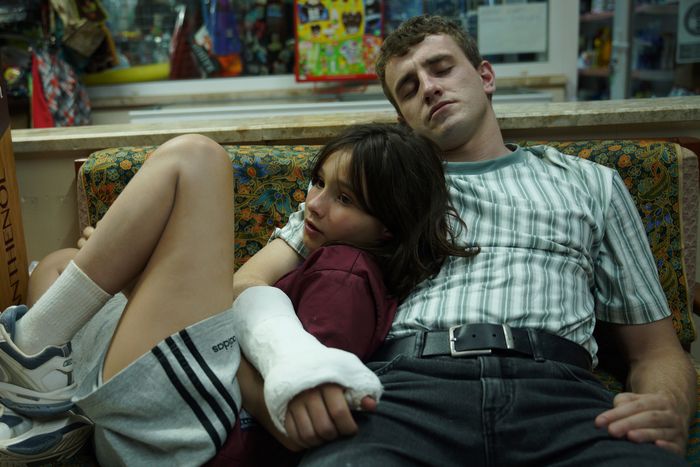
Calum is a young dad, young enough that when he’s out with 11-year-old Sophie (Francesca Corio), people assume that they’re siblings rather than a parent and child. Someone makes this mistake not long into Aftersun, and you half expect Calum to let it pass uncommented on, or to be embarrassed when he has to explain the truth. He is, after all, played by the irresistible Paul Mescal, prince of the charming, unreliable heartthrobs, and with his rumpled looks and empty pockets, he comes across as someone more at home carousing with his boys at the bar than periodically reapplying sunscreen to his daughter’s back to ensure that she doesn’t burn. And yet Calum, for all the other ways that things have not been working out the way he planned, is proud to announce that he’s Sophie’s father, and proud to be taking her on a vacation he can’t really afford to a discount beach resort in Turkey. Aftersun, the debut from Scottish filmmaker Charlotte Wells, is a dual portrait of a girl on the cusp of adolescence and a young man feeling adrift in adulthood, and it’s a work of masterful and almost unbearable melancholy.
It’s one of the best movies of the year, though it damn well makes you work for it, with Wells taking such a deliberately oblique approach to her premise that it at first comes across more as an affectation than as subtlety. Aftersun is made up almost entirely of the trip in question, which, we soon grasp, took place two decades ago, though it’s pointedly only Sophie, played as an adult by Celia Rowlson-Hall, who we get to see in flashes in the present day. It’s frequently Sophie who’s shooting the crummy digital video footage we periodically cut to, the lower resolution and artifacting as much a signpost of the era as the soundtrack, which is littered with late ‘90s detritus from the Lightning Seeds, Catatonia, and Aqua. She and Calum — who broke up with her mother years ago — turn the camera to the sun and the pool, but more often they point it at one another, and in the opening shot Sophie has trained the lens on her father in order to interview him, asking him if this is what he imagined he’d be doing when he was her age.
She doesn’t seem to realize how this question devastates him, though it becomes clear when the film returns to this moment later and shows it from the outside. Calum’s planned this holiday over his 31st birthday, which may not be a major milestone, but for someone who jokes about being surprised he made it to 30, represents a panicky forward trudge of time with little to show for it aside from the funny, self-assured daughter he doesn’t get to see much. But Calum’s depression remains an only half-glimpsed mystery, the shots of him reflected in a television screen and a coffee table surface serving as visual reminders of his elusive nature. There comes a moment when you start to actually comprehend your parents as people separate from yourself, ones whose lives stretched long before your arrival and contain vast unseen realms. Sophie, who’s played with such unaffected ease by Corio that she doesn’t seem to be acting at all, may not be there yet, not any more than she is one of the teenagers she hangs out with one evening. But she’s close enough to sense what she doesn’t yet know, in the same way that she playacts romance with a boy from the arcade after watching the older kids canoodle, the two sharing an tentative open-eyed kiss.
Tiny details like that have submerged but seismic resonances throughout Aftersun. That experimental peck is the start of years of exploration that will lead to Sophie, at 31 herself, to be in a relationship with a woman with whom she has a baby. A stack of books about meditation and tai chi are indications of Calum’s search for meaning. Calum left Scotland, where Sophie lives with her mother, for a life drifting around London, and when she asks him if he’ll ever move back, he gives her an answer that doubles as a description of his psychic state: “There’s this feeling, once you leave where you’re from, that you don’t totally belong there again.” In the closest this delicate film has to a pivotal sequence, Sophie puts their names on a list to sing karaoke in what’s clearly been a tradition for them before, though this time Calum’s not in the mood, and so Sophie goes up alone, her bravado fading as she slogs her solitary way through a rendition of “Losing My Religion.” Throughout Aftersun, Mescal is a marvel of boyish fun masking a deep streak of self-loathing he tries mightily to hide from his daughter, but in that sequence, as Sophie stands there discovering insecurity in real time, he’s easy to hate.
Neither could articulate why they’re so upset, though the night spirals from there, Calum leaving his daughter and getting drunk in an abdication of parental duties he’s otherwise proven himself devoted to. Aftersun isn’t a recreation of a memory, though the act of remembering is obviously at its core. Rather, it’s about trying to square the intimacy of being cared for as a child with the perspective that comes with being an adult. It’s about wanting to reach across time, and to meet a loved one in an impossible space where, for once, you’re both on the same level, and you can finally understand them for who they are — or who they were.
More Movie Reviews
- The Accountant 2 Can Not Be Taken Seriously
- Another Simple Favor Is So Fun, Until It Gets So Dumb
- Errol Morris Has Been Sucked Into the Gaping Maw of True Crime


